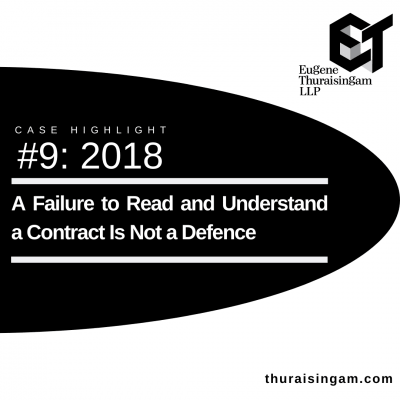A Failure to Read and Understand a Contract Is Not a Defence
Broadley Construction Pte Ltd v Alacran Design Pte Ltd [2018] 2 SLR 110
A party cannot rely on his failure to read and understand the contract to argue that such contracts are not binding. This was an important point successfully argued by our team, including Syazana Yahya, in Broadley Construction Pte Ltd v Alacran Design Pte Ltd [2018] SGCA 25.
The Appellant, Broadley, entered into a contract with the Respondent, Alacran for the supply of equipment. After some time, Broadley began defaulting on its payments to Alacran. There were settlement talks between Broadley and Alacran, followed by a Letter of Undertaking signed by both Broadley and Alacran to settle the matter (the “Undertaking”). The Undertaking provided that Broadley would no longer be liable as regards the outstanding sum by Alacran.
In the talks leading up to the Undertaking, parties agreed that the main contractor will pay the outstanding sums directly to Alacran from the money that the main contractor owed Broadley. However, Alacran informed Broadley that if the main contractor defaulted on the payment, Broadley would remain liable for any outstanding sums. Broadley remained silent, which Alacran took to be an agreement to its suggestion.
The Court of Appeal found that Alacran remained bound by the express terms of the Undertaking despite what was discussed. In doing so, the Court of Appeal clarified some principles relating to misrepresentation.
First, silence usually only constitutes a representation by a person where that person has a duty to speak. A duty to speak is to be assessed by reference to how a reasonable person would view the silence in those circumstances. In the present case, Broadley’s silence was ambiguous at best.
Second, even if there was a misrepresentation by silence, Broadley had corrected the misrepresentation by the express terms of the Undertaking. It was incumbent on Alacran to read the Undertaking and clarify if he did not understand it. If Alacran chose to sign it without clarification, Alacran did so pursuant to their own assumption that it reflected the agreement during the talks, and not in reliance on Broadley’s misrepresentation. Therefore, Alacran had not been induced by Broadley’s misrepresentation into entering into the Undertaking.
This case underscores the importance of a party reading and fully understanding the contracts that it chooses to sign. If the contract contains clear and express terms which are contradictory to what had been discussed with counterparties, it may be an uphill task to argue that such contract should not be binding. It would be prudent, especially where a contract is sought to be executed after discussions with counterparties, to obtain legal advice to ensure that the contract is in line with such discussions and the party’s understanding.






